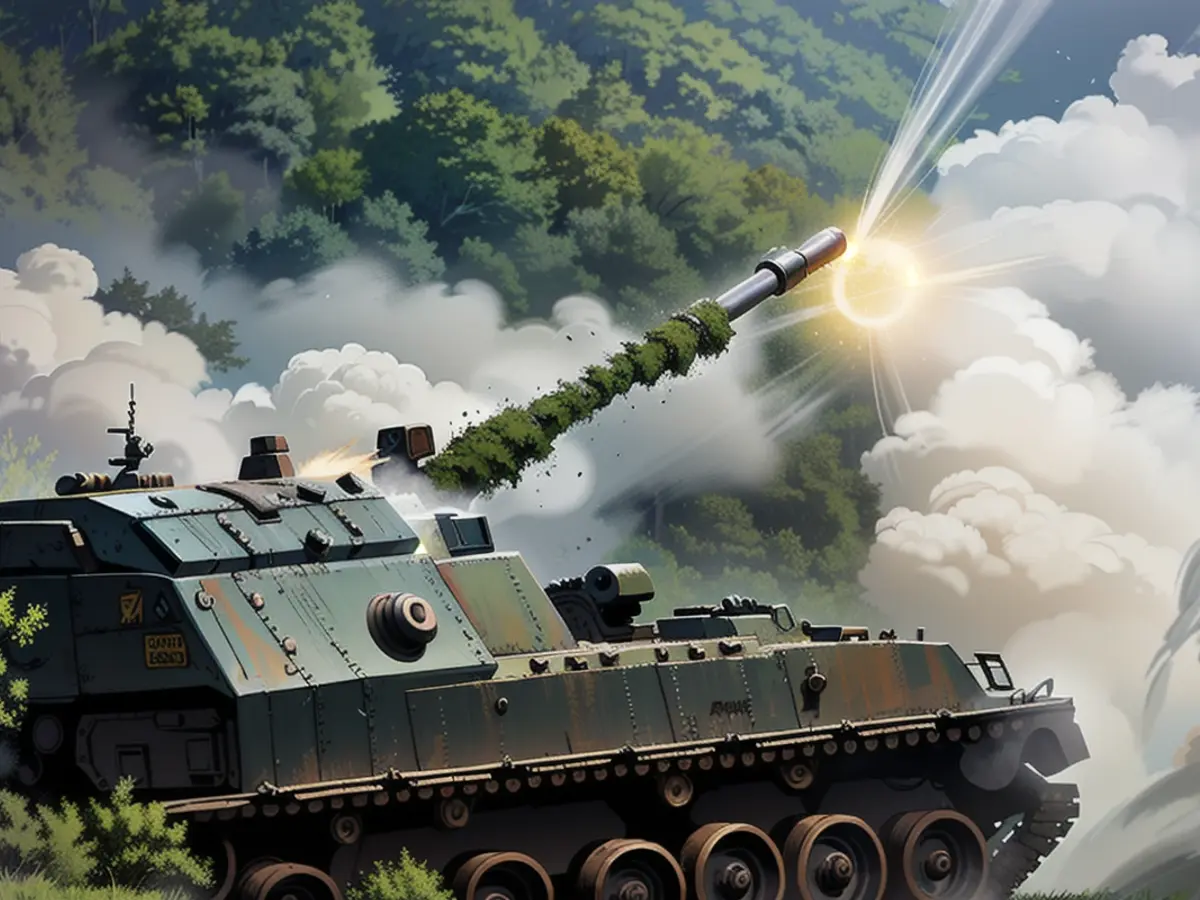Scholz denies Putin a safe rear area
over four days, French President Macron's unexpected declaration and German Chancellor Scholz's significant decision merge: Ukraine must also be permitted to employ western weaponry to strike Russia. The intricacies of this decision are as unclear as the decision-making process.
Emmanuel Macron was previously prepared for this move. During last week's joint press conference at Schloss Meseberg, France's president positioned a precise Ukraine map beside his comrade, German Chancellor Olaf Scholz. The image from French newspaper "Le Figaro" illustrated how Russia was attacking the Ukrainian metropolis of Kharkiv from its own soil. "They must be granted permission to nullify the military strongholds from which the rockets are fired, as well as the military strongholds from where Ukraine is attacked," Macron asserted. This statement implied the French government's position. Yet, on the 5th day, it became clear: Germany's government leader agreed as well.
Recently, Ukraine has been subjected to assaults "principally in the Kharkiv region from positions in the contiguous Russian border region" Hebestreit, government spokesman revealed. "Together, we believe Ukraine holds the right to defend itself against these attacks," he added. Ukraine could, therefore, utilize the weaponry systems and munitions supplied by other countries - "including ours." Notably, German-supplied Panzerhaubitze 2000 and the MARS II rocket launcher are rumoured to be used in this situation.
Was Scholz stunned or informed?
Next to Macron, Scholz feigned confusion: "Ukraine has all lawful options for their actions," commented German Chancellor Scholz regarding Macron's claims. Scholz had been in accordance with Kiev and Western capitals' previous agreements. It remains confounding: did Macron surprise Scholz or had he been forewarned? Despite their fervent recent friendship celebrations, such an occurrence would be inconsistent. If Scholz was briefed, why were the uncertainties so persistent - evidenced in the words from government spokesman Hebestreit on the following day?
The German government insists on earlier discussions between Macron and Scholz before the Meseberg press conference. A solid agreement seems not to have been attained on the 5th day. Concurrently, personnel from the USA, France, UK, and Germany convened on the 6th and 7th to elaborate on the usage of western weapons by Ukraine against Russian targets.
On the 7th day evening, the US Government verified press rumours that they had authorized Kiev to employ American weaponry against Russian targets to a specific extent. This scenario would exclusively target counterattacks to defend Kharkiv. It is unclear whether other European allies will adhere to this curtailment. Hebestreit's blurry delivery in the federal conference evoked questions from journalists.
Is Kharkiv the only targetable region?
Can Kiev currently use western weaponry to target Russian military locations on foreign territory beyond Charkiv? Ukraine has implemented drone strikes and sabotage operations on Russian targets thousands of kilometres from its border. The Russian government has also been targeted - along with missile-firing bomber squadrons' airbases. Surely, these targets qualify as militarily significant locations.
Western allies supporting Ukraine aim predominantly to hike Russia's dangers in the vicinity of the Ukrainian border. Russian military equipment and soldier congestions should be equally susceptible to harm, as were Donetsk, Luhansk, and Crimea when Western-produced missiles and grenades continuously damaged targets.
Russia's advancements in the Charkiv region have complicated Ukraine's circumstances. The battle line has advanced by several hundred kilometres. With the precarious situation, NATO Secretary General Jens Stoltenberg demanded from Macron's side by Scholz that the West allow Ukrainian attacks on Russian soil with western weaponry.
A significant escalation during an election campaign
Notably, this is a pivotal step for Scholz. He is labeled as hesitant by Ukraine's prominent Western allies. Germany has supplied more military assistance to Ukraine than any other European nation, significantly contributing to the air defense of large cities and civilian infrastructure. Scholz, however, has constantly been cautious regarding any action not pursued by the US. He also strictly dismissed the possibility of direct contribution from German soldiers in the battle. Nevertheless, with his recent decision, he shifted the tide, potentially dimming the prospects of any potential re-election campaign. Additionally, Germany could be at risk of escalated hostilities, threatening its security and stability. The thought of western weaponry being used on Russian soil is sure to alleviate some of Ukraine's challenges and further provoke Russia.
Now, French President Macron prefers to keep Putin in the dark about what else might be coming for him. Macron even thought about letting NATO soldiers be deployed in Ukraine during winter, which displeased Scholz. Macron quickly reminded Scholz that delivering weapons, then tanks, and ultimately fighter jets to Ukraine had been previously vetoed. Scholz had always reacted unfavorably to this.
However, now everyone is showing up, or the imminent deployment of American-made F16 fighter jets is about to happen. It seems now that Scholz is playing along as if new realities have emerged that he can only accept. Is this actually the case? Or is the politicking chancellor attempting to create the image of the one who's never the first to escalate the conflict with Russia, but always follows suit in a loyal manner? At the very least, Ukraine should no longer place as much weight on German sentiment when it comes to its struggle for defense. It could soon fire a cannon from Germany, mounted on a Panzerhaubitze 2000 from Bundeswehr equipment, at Russia.
Read also:
- In response to Russia's attacks on Kharkiv, German Chancellor Scholz acknowledged Ukraine's legal right to defend itself, potentially implying Germany's support for providing Ukraine with Western weaponry to counterattack.
- During the Meseberg press conference, French President Macron presented a detailed Ukraine map, highlighting the Russian forces attacking Kharkiv from their own territory, and advocated for the removal of Russian military strongholds to protect Ukraine.
- German Armed Forces are reportedly preparing to supply Ukraine with advanced weapon systems like the Panzerhaubitze 2000 and MARS II rocket launcher, contributing to Ukraine's defense against Russian aggression in the Kharkiv region, as per reports and unconfirmed sources.








